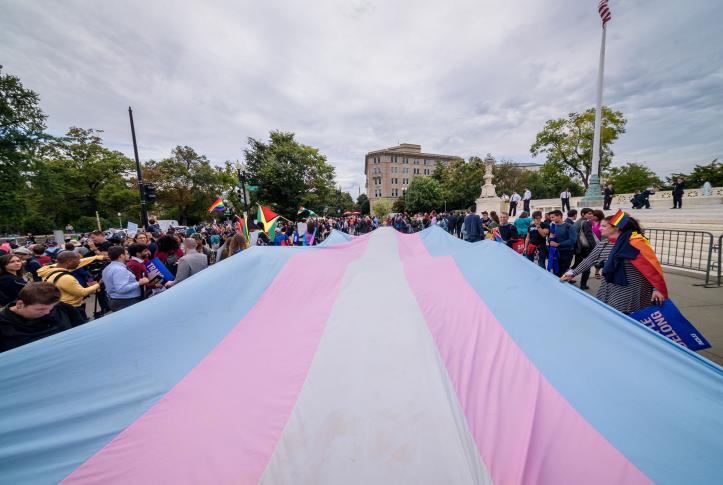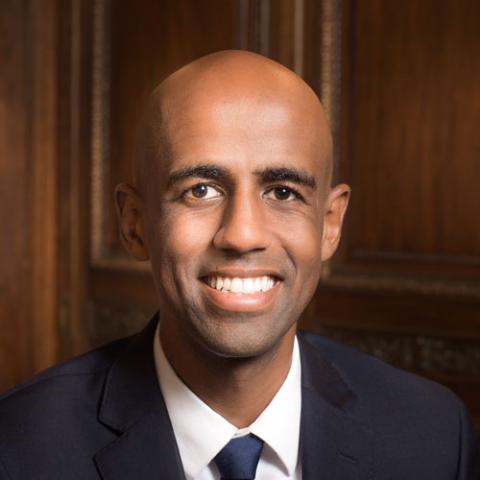This post is updated since its original publication on November 8, 2018.
The Biden administration on May 10 said it would provide protections against discrimination in health care experienced by transgender people, reversing a policy put in place by the Trump administration last year. This is a significant victory for trans people, because the federal government again will protect them from discrimination by health care providers and other health-related organizations that receive federal funding.
The Trump administration policy was finalized on June 12, 2020, reinterpreting Section 1557 of the Affordable Care Act. Section 1557, which prohibits discrimination based on race, color, national origin, sex, age, or disability, was defined in 2016 as applying to gender identity. As a result of that 2016 definition, health providers and insurance companies that received federal funding had to provide the same access to coverage, services, and care to transgender people that they would to cisgender people (i.e., those whose gender identify matches the sex they were assigned at birth).
A federal judge blocked this rule from taking effect on August 17, 2020, granting temporary relief, which the Biden administration’s recent actions make more permanent.
Were the Trump rule have gone into force, it would have severely curtailed health protections for transgender people. Trans people may have faced discrimination in accessing health services, receiving care consistent with their gender identity, and getting coverage for gender transition services without recourse. In the final rule, the U.S. Department of Health and Human Services’ (HHS) Office of Civil Rights stated that it expected half of 137,501 covered entities — including hospitals, insurers, state Medicaid agencies, community health centers, and physician practices — to rescind these protections through changes in policies and procedures. The move by the Biden administration will have major implications for the health and health care of transgender and gender-nonconforming individuals, one of the most vulnerable populations.
The announcement last June of the rule came during the same week in which the Supreme Court ruled that Title VII of the Civil Rights Act of 1964, which prohibits employment discrimination, also applies to LGBTQ+ individuals.
HHS said on May 10 that 25 percent of LGBTQ+ people who have faced discrimination postponed or avoided receiving necessary medical care because they feared further discrimination. HHS’s decision indicates a commitment to protecting the health of trans people at a time when several states have launched legislative attacks against the rights of trans people, particularly children.
One of the Most At-Risk Populations
The approximately 1.7 million trans people in the United States face significant hardships that increase their risk of poor health outcomes. First, two of five (39%) report having low incomes (i.e., earning less than $30,000 a year per household), which can have negative effects on health. In addition, trans people are more likely than the general population to face discrimination in education and employment, abuse by the police, harassment in public spaces, and physical, verbal, and sexual assault. Nearly all of these issues are worse for trans people of color.
The toxic stress of living as a trans person in America can negatively affect physical and mental well-being. Trans people are more likely than their cisgender counterparts to report poor physical health, experience mental health issues like anxiety and depression, and have substance abuse problems. Forty percent have attempted suicide, compared with 4.6 percent of the general population.
Poor Access to Quality Health Care
Transgender people often face barriers to getting the health care they need. One of five transgender adults is uninsured. Trans people often skip health care because of cost: nearly half (48%) have postponed medical care when sick or injured and avoided preventive care (50%) because they couldn’t afford it.
Trans people often hide their gender identities from health providers out of fear of retaliation and harassment. Only 40 percent of trans people report being out to all their medical providers. It’s understandable that many would want to conceal this information: 28 percent of trans people report experiencing verbal harassment in a medical setting and 19 percent report having been refused medical care by providers because of their gender identity. Because of stigmatization and harassment, 28 percent of trans people report avoiding care altogether.
Of those who do make it to the doctor and disclose their gender identity, half report having to teach their medical providers about transgender individuals’ health care needs and appropriate medical care. Lack of awareness on the part of medical providers — in part because of lack of training — has serious implications for care quality. Moreover, when people veil their identities in medical settings, their providers miss important information that should inform screening, diagnosis, and care.
The Consequences of Erasing Transgender Rights
For trans people, health care visits can add to distress, rather than provide help. The American Medical Association (AMA) opposes policies like the Trump administration rule that could harm trans people, stating that “laws and policies that restrict the use of public facilities based on biological gender can have immediate and lingering physical consequences, as well as severe mental health repercussions.” The AMA recommends equal access to care that corresponds with a person’s gender identity “to protect the public health and to promote social equality and safe access to public facilities and services.”
If the protections of Section 1557 no longer applied to trans people, they may have faced greater discrimination, leading to more avoidance of care and, ultimately, more unmet medical and behavioral health needs.







